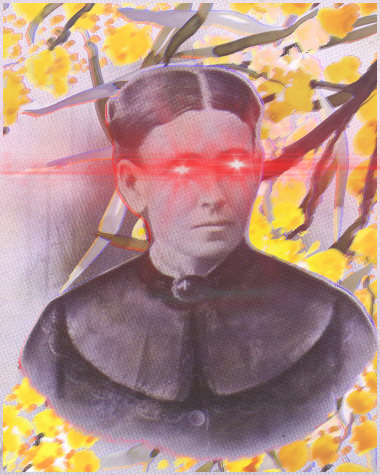Why can't it be something fun like swapping surnames and then creating a portmaneau or blended name for the kids.
"We should reject the patriarchy and refuse to adopt our husband's surnames as our own!""
"Right on!"
"We must take back what is ours and overthrow men's dominance over women. We should fight to keep our maiden names."
"Yeah!!
Wait a sec - we're going to reject the cultural practice of taking on our husband's surnames and we're going to keep the ones that we were born with?""Exactly!"
"So we will keep the surnames that our fathers gave us in order to reject the patriarchy?"
"I... uhh... hang on, let me check my notes here."
(I'm not shitting on anyone who chooses to do this btw; you do you. After all you aren't property to be transferred from one owner to another. I'm just illustrating why bourgeois feminism is a dead end and why Marxist feminism is the only real path forward for women's liberation.)
I mean you gotta start somewhere. My surname might also be my grandfather's surname, but people don't think about that, they think about how my surname is my mother's surname instead of my father's.
Yeah, I'm with you. I just think that ultimately it's window-dressing, call me a class-reductionist if you will.
Women aren't going to be liberated by keeping their father's surname because there's this context of an always-already existent gender subjugation that they find themselves born into, which is what my little vignette is basically pointing towards.
In lukewarm defence of myself, I feel the same sorta way about stuff like workers striking for minor pay increases or Bernie-tier politicians; I half-heartedly support that stuff—far be it from me to oppose it—and any gain no matter how small is worth something to the masses but, as a revolutionary, I don't think it will ever go far enough in and of itself (hence why I'm also historicising this within the context of The Lucy Stone League of a century ago elsewhere in this thread).
To paraphrase James Connolly: our demands are most moderate, we only want the earth.
Oh yeah, it's definitely not a remotely revolutionary action in itself, but like minor strikes and leftish politicians, it's one of those things that plants a seed of radicalisation - it's kind of a pain having people be weird about it, but having to tell people that my parents are married, have kept their own names, and gave me my mother's surname has caused a few of them to actually question why taking the husband/father's name is normal.
Proletarian revolution is still way off on the horizon here in the imperial core - if anything I fear we're still more at risk of even-more-reactionary uprisings as the treats dry up - so every little thing that causes someone to start questioning their beliefs gives us an opportunity to illuminate and contextualise with the ultimate aim of awakening class consciousness. It's a bit like introducing concepts through demonstrations in teaching - a Van der Graaf generator isn't particularly important in physics, but getting people to ask how their hair stands up gives you room to start explaining electricity and polarities.I agree and I'll take any opportunity to do the ol' agitate/educate/organise because as far as I'm concerned we're running desperately short on time and we can't afford to turn our noses up at the opportunities that get presented to us.
I think one thing about me that probably rubs people up the wrong way is that I consider this space to be a notch or two above what the general level of awareness is so I am much more critical than I would otherwise be, partly because I let my hair down here, if we were talking about it irl because face-to-face I'm going to agree with this and I'm going to encourage anyone who cares to get more involved in organising and engaging in activism, despite my misgivings, and I'll even furnish those people with arguments in favour of the position but I'll probably make mention of the Lucy Stone League to gently gesture at the fact that a century later and women are still thoroughly under the bootheel of patriarchy despite their best efforts or I might make note of the suffragette Edith Margaret Garrud and how women's rights were advanced by using Jujitsu and wielding hatpins more than any symbolic action. This is in the hope that they're going to take these ideas and learn more about them in their own time, and that they'll develop a richer understanding of what works when it comes to achieving social change.
Ah, that's fair - I think I'm often less critical here because I spend so much time around the full spectrum of reactionaries day to day that I'm just happy to be in an actually leftist social space. Plus I know people like you are hanging around to drop a bonus textbook for anyone wanting to know more - I'm partial to using the suffragette arson and bombing campaign as an example of effective political activism, but I hadn't encountered the Lucy Stone League before, so I'll be able to bring them up in the future.
When my ex and I got married, we picked a new surname that we both liked but didn't have any connection to. We're not together anymore but I have no plans to return to my original name b/c I still like it and basically all of my friends and colleagues know me by the current name
This is incorrect, the feminist stance is that women decide if they or their wife get to keep the surname in a game of axe throwing. In case of a draw, both women end up with a hyphenated double name.
I was with you until you started talking pro-gamer-marriage nonsense
The couple should be presented with a bowl of beans and whoever can eat it the fastest gets to keep their name
Women keeping their last names as in such notoriously feminist paradises as all of Latin America
It's still from the woman's patriline though.
If we had one name transmitted patrilineally and one name transmitted matrilineally, that'd be really cool, and would also not cascade beyond 2 surnames.
No, children should get all their parents' surnames ad infinitum. My grandkids will have 8 surnames. Their grandkids will have 32.
Say what you want, but this system has the fewest edge cases.
Jugemu Jugemu Gokou no Surikire Kaijari Suigyou no Suigyou Matsu Unrai Matsu Fuurai Matsu Kuuneru Tokoro ni Sumu Tokoro Yabura Kouji no Bura Kouji Paipo Paipo Paipo no Shuuringan Shuuringan no Guurindai Guurindai no Ponpokopii no Ponpokonaa no Choukyuumei no Chousuke but every part except "Chousuke" was actually the surname
Why's it gotta start with you, rather than retroactively accounting for as far back in your ancestry as you can go?
And how do you do the ordering of all those names?
It starts with me because I'm a special boy.
The ordering is alphabetical of course.
You don’t have to go back too far before you’re gonna be mixing alphabets and using altered versions of last names.
Hey wait a minute, doesn't your idea also have this issue? Say currently my name is Al Funky Stuff and I have a child with Lea Johnson Smith, the kid's surnames would be Funky (my patrilineal name) and Smith (my wife's matrilineal name). But my wife's matrilineal name is not actually matrilineal, it's her mom's patrilineal name. So we'd have to go and switch it out for her mom's second surname, which itself is her grandma's patrilineal surname, and so on. So you'd end up having to trace your genealogy regardless of how many surnames a child inherits. Unless I misunderstood your system?
No, children should get all their parents' surnames ad infinitum. My grandkids will have 8 surnames. Their grandkids will have 32.
Say what you want, but this system has the fewest edge cases.
Having names like the ones breeders give to purebred dogs would be hilarious.
Abolish surnames, also abolish names, replace everything by 72 alphanumeric characters codes that are absolutely unique so we abolish all discrimination and administrative ambiguity /s
The advent of surnames in Europe heralded the downfall of feudalism so I have a soft spot in my heart for them based on that historical fact.
So in Europe up until this point, people stayed in their own villages and if there were two Johns in the same village then one would be Tall John and the other would be Pious John, or Strong John or Fair(haired) John. Basically you were your first name because there was absolutely no need for a surname.
The only use for surnames was for the aristocracy to lay claim to their incestuous lineage and their ancestral holdings and shit.
Anyway, suddenly the black death rolls around and wipes out 1/3 to 1/2 of the population in Europe. Crops are lying in the field to rot because there just isn't enough labour available to do what needs to be done to survive until next season.
So the landlords smell trouble brewing and it becomes obvious that unless somebody harvests that grain then their village is fucked, and they sure as hell aren't about to roll up their velvet sleeves, so they begin to lure nearby villagers to abandon their lord and the crops of their home village in favour of shifting next door and harvesting this lord's crops with the promise of better pay and conditions.
Suddenly, where feudalism was once virtually set in stone, you have this black swan event and all this labour begins to get freed up to move around and labour starts to get a little bit of leverage as the foundations of feudalism begin to crack.
So next thing you have people from all sorts of villages moving around from place to place and everyone is named John and Henry and Margaret and Catherine and shit but also nobody knows anyone else because suddenly there's this influx of people from everywhere else. So this ain't cutting it anymore, and people begin to get named after their professions (John the blacksmith = John Blacksmith = John Smith, Henry the fuller = Henry Fuller, Margaret the baxter = Margaret Baxter etc.) or by things like patronymics (Johnson, Smithson, Ericson) or their personally-distinguishing characteristics or landmarks (in German this is really common with surnames like Bach, Bohm, Berger, Engel).
Anyway this is the moment where the tide started to shift and where feudalism was moribund - it would take other factors like the enclosure of the commons, the advent of chartered corporations for naval looting/trading/mass slaughter and enslavement expeditions, and the invention of the steam engine before we would see capitalism develop into its fully-fledged form but this freeing up of labour power and a rebalancing of economic and political power that shifted slightly in favour of serfs was enough that the house of cards that was feudalism would eventually come tumbling down.
And that's why surnames heralded the downfall of feudalism - as soon as labour stopped being bound to one ancestral plot of land and lords started competing against one another for "employees" (if you'll forgive me for using an anarchronism), where people needed a new way to distinguish between people who shared the same name, there the proto-capitalist/nascent capitalist market forces began to emerge within the cracks in the foundations of the old feudal material conditions.
Yes, I cannot emphasise how much I would encourage you to read more history.
There are so many threads you can tug at and they always lead back to the same themes, if not the very same things themselves. There's a reason why historians often end up implicitly Marxist, if not out and out card-carrying communists, and it's not by accident. (There's another comment I wrote under this post somewhere where another person also nudged me to talk about some completely different threads of history which I wove together into a little crash course in history that you might find interesting too.)
I have my criticisms of Joseph Jacotot but he was one of the good liberals imo and I really think that, at least when it comes to matters of history and pedagogy, his panécastique model is valid and I think the spirit of it is embodied in that Carl Sagan quip: "If you wish to make an apple pie from scratch you must first invent the universe"; I genuinely believe that if you tug at one thread of history long enough you can arrive at anything else in history. (This might be my galaxy-brain autistic/ADHD mind speaking lol - genuinely, this is kinda how combined-type ADHDers describe their thinking.)
The trick is to find whatever sparks inspiration in history and to just chase that down every rabbit hole it leads you to. It doesn't matter what it is. It could be guns, it could be cars, it could be knitting, it could be the complex economic and social organisation of a particular aboriginal Australian country that sprang up around the aquaculture of eels. It doesn't matter in the slightest; one of the most captivating books I've ever read was a book about Salt by Mark Kurlansky. Just find that topic that sparks wonder in you and wring it for all you can because you'll end up following it across countries and time periods and all sorts of events and figures in history.
The more you learn, the more exciting and wilder it gets.
There's literally a direct through-line that runs between fish that display iridescent colours on their scales, British-Australian imperialism and the displacement of the Banaba people, the Incan word for shit and the genocide and colonization of the Americas, the two world wars and the German chemical industry that would go on to enable Nazis putting "undesirables" to the gas chamber, the invention of methamphetamine, all the way to Rockefeller and the founder of Planned Parenthood, Margaret Sanger.
(And there's so many detours along that route: do you want to follow IBM and how US industry such as Ford enabled the Nazi war machine and its industrial-scale genocide and how during WWII Germans learned to take shelter in Ford factories if there weren't any bomb shelters nearby when bombs started dropping? Do you want to learn about the early German concentration camps in Namibia that formed the blueprint for the Nazi concentration camps? Do you want to go down the Operation Paperclip route and to examine how post-WWII was a renazification in the west? Do you want to go down the Ha'avara Agreement path? Do you want to go down the eugenics path to learn about Carnegie and how his fortune is a direct product of the Opium Wars, the century of humiliation, the Chinese civil war and the establishment of the CPC and how this ties into the Forbes dynasty and the genocide of Native Americans?)You can legit go from what makes shiny fish shiny to the goddamn Opium Wars and the US politician John F Kerry, and in doing so you will travel across the whole world.
Just find that one thing and dive in then chase it until you tire of it. Then find the next thing and do the same. The real trick, though, is seeing if you can find a way that the first and second things happen to connect up. And just keep doing that.
So you're saying blockchain names will herald the end of capitalism??? /s
I propose the following:
- Upon marriage, check who has the rarer surname
- The spouse with the more common surname should change it to the rarer surname
- In the case of divorce, the spouse with the changed surname should keep the surname
Of course, people are free to do whatever they want, but this is just an idea. Because unlike the convention of always taking the husband's surname — which inevitably leads to surname extinction and a thoroughly unequal distribution of surnames — this system would by my reckoning gradually lead to a completely equal distribution of surnames.
? Is this really the feminist stance? I thought it was that women should have the choice of doing what they want with their surnames
This is a historical quirk but, in case you had any illusions about us living in the 20s, the (bourgeois) feminist movement for women to keep their surnames upon marriage kicked off in the 1920s in the US.
There's a whole essay in here somewhere about how bourgeois feminism was co-opted by capitalism from its very outset, how women became a target demographic for smoking, the colour green, why you have to add eggs into box cake mix, and the Guatemalan coup of Jacobo Arbenz and the Cuban revolution. Oh and Nazis and Sigmund Freud too, of course.
There's a whole essay in here somewhere about how bourgeois feminism was co-opted by capitalism from its very outset, how women became a target demographic for smoking, the colour green, why you have to add eggs into box cake mix, and the Guatemalan coup of Jacobo Arbenz and the Cuban revolution. Oh and Nazis and Sigmund Freud too, of course.
I want this as a tagline just for the immediate transition from putting eggs in cake mix to the Guatemalan coup. I got whiplash lol
This story itself is a real trip. If I didn't know it by doing my own reading into all of it, there's zero chance I'd believe this is anything but some Pepe Silvia-tier rambling.
Oh no, I believe you. I know how that bourgeois feminist wave in the 20s started as a reaction to more revolutionary feminist movements coming out of the socialist nations. I also see how United Fruit could have utilized the advertising wave started by Freud's brother (in Nazi Germany then America) to bolster support for the silent genocide on grounds of making American women's lives easier or something.
Would love to read the essay if you can find it.
Oh haha, there isn't an actual essay that exists out there I was just trying to say that I would be able to write an essay's worth of stuff on this topic.
Someone already nudged me to write it all out so you can find my sketch of a would-be essay here in this comment.
I need to sleep so I'm going to be a bit brief on this one but here goes:
Edward Bernays is the self-styled "father" of modern PR. This is a half-truth but it's not entirely a lie. He's the nephew of Sigmund Freud and he lives in high society in New York. Bernays decides that he wants to apply Freud's psychoanalytic model to marketing and PR. He literally writes a book titled Propaganda, which would one day find its way onto the bookshelf of none other than Goebbels, who used it as his bible to persecute Jews like Bernays and, of course, Freud himself who fled Nazi Germany at the behest of Bernays.
Anyway, Bernays' wife is a socialite and she is a key figure in the Lucy Stone League (linked in the comment above) as well as other bourgeois feminist organisations and movements.
Bernays, ever the opportunist and in the employ of a tobacco company, uses this as an opportunity to start marketing to women and in one famous coup of the early PR industry, he staged a situation where a feminist demonstration in New York would have a photograph taken of one of the main organisers smoking - women smoking in public was seen as scandalous at this time - to be published as the lead story in the newspapers, putting cigarette consumption front-and-centre in women's struggle for equality.
He dubs this the "Torches of Freedom" movement and associates the idea of women smoking closely with the statue of liberty and her blazing torch.
Suddenly it becomes edgy and cool and seriously rebellious for women—upper class women who don't have the same risk of social backlash—so it becomes a trend, cigarette sales skyrocket, and Bernays starts working on marketing cigarettes to women. This is also an early example of gender division in marketing. There's the annual equivalent of the Met Gala taking place and so Bernays attempts to associate the colour green—a key colour in Lucky Strike packaging at the time—with this Green Gala held for rich socialites so that it would tie in with the cigarette packaging.
At some point, idk exactly when, box cake mix gets developed but it's not selling very well. This is at a point where I think all of the ingredients except for water and maybe butter/oil (but maybe not) were already powdered and you literally just add water to make a cake. Bernays, high on the Freudian supply, decides that what needs to happen is that there needs to be some symbolic action of feminity in these instant cake mixes so he instructs the company to remove the powdered egg and change the recipe to call for adding fresh eggs because, like, women and eggs and ovulation and feminine energy and weird shit like that. This works, not for the tortured Freudian symbolic reasoning Bernays held but because women felt like they were still making a cake rather than just making a bowl of cereal. (Not gonna go into the advent of the hearty American bacon and eggs breakfast or the "9 out of 10 [professionals] recommend..." marketing trope, but that's also tangentially related to this story.)
At some point you have Chiquita (then United Fruit Company) basically running Guatemala as an imperial outpost. Then Jacobo Arbenz, a milquetoast social democrat reformer, gets elected on a very popular platform of land reform - Chiquita maintained an effective monopoly on banana growing in Guatemala by purchasing all of the land and only using a proportion of it to actually grow crops with the rest left fallow. People were borderline starving and they were prevented from primary production to create products to sell because Chiquita owned all the good, arable land so the people of Guatemala were condemned to poverty and hard labour on—you guessed it—Chiquita banana plantations so the US could have cheap bananas and Chiquita could turn a mean profit doing so. Chiquita also grossly underestimated the value of the land for taxation purposes so Arbenz quite cleverly decides that his government will compulsorily acquire the fallow land to redistribute to the people and he compensated Chiquita based on the grossly underreported value of the land.
Chiquita wasn't having a bar of it.
So they get Bernays to organise a press junket tour of Guatemala so that the newspapers can drum up support for a military invasion of Guatemala to establish what would later become known as a banana republic. (From memory the US political machinery was less interested in committing to war at this point in history, but don't quote me on that part.) And this strategy works. (I feel like Bernays had some connections to the CIA that he leveraged in this but I forget.)
Anyway, who happens to be in Guatemala at the time of the coup? None other than the man, the legend, the hero of the people himself - Che Guevara. Che has front row tickets to witnessing US imperialism and the lengths that they will go to when their precious bottom line faces a minor speed bump. And this is a deeply radicalising moment for Che because he understands that there is no reform delicate enough, there is no popular support massive enough, there is no cause morally just enough that would stay the US' hand.
So Che learns that political power comes out the barrel of a gun and this goes on to directly shape his politics, his strategy, and the Cuban revolution itself.
And that's the story. Some of it anyway lol.
Sources:
Bitter Fruit by Steven KinzerThe Father of Spin by Larry Tye (honestly not a great book - pretty piss-poor writing tbh but obviously the compelling subject redeems it somewhat)
Idk what else, I think that's mostly it. I'm missing out on a source for Che's part of the story but maybe someone will chime in with a good one - surely he wrote about it in The Motorcycle Diaries right?
I’d read about Bernays a bit but had no idea that he was connected to that coup or that Che was present. Absolutely wild connections.
Yeah, it's pretty wild.
But also this is why history is so important - I can tell who is familiar with history and who isn't based on their political beliefs. It boggles my mind that I still regularly encounter people who call themselves socialist and they espouse utopian socialist ideals but they aren't even aware of political philosophy enough to call it that and I can ask them what happened to the ideas of Fourier and Saint-Simon and Robert Owen but they'll just blink and stare like I'm speaking a completely different language. But I'm like "Ah! You're at an early-19th century level of political development and you haven't even done the reading on this movement yet."
Or they'll talk about reformism and you can ask them whatever happened to the Fabian Society in the UK and what lessons we can learn from Allende, and Arbenz (or Sankara, Machel, Bishop etc.) and they won't have any answers because they've never really looked into the thing they're touting as the solution to all of our problems.
Or they'll talk about co-ops, which is a terrible thing to do around me because I will ask them for a good example of a co-op. Of course the answer is Mondragon and—without even getting into matters of self-exploitation or trade union consciousness or how this model (arguably) economically hamstrung socialist Yugoslavia and the Spanish Republic during the Spanish civil war and how the Soviets resolved these problems when they emerged in their own country by the dissolution of the worker's councils—this is when I talk about how Mondragon was founded under the fascist Franco, how it flourished under Franco, and how Franco held it up as the exemplar for the new fascist economic model for Spain and how this also dovetails perfectly into the Italian fascist economic push towards a self-sufficient and corporatist economy.
Usually the best response I get is some cheap complaint about "guilt by association", despite the fact that I'm not saying "co-ops are bad because Franco liked them and Franco is bad therefore co-ops are bad".
Of course, they never know about the autogestión movement in Argentina that kicked off at the turn of this century and look how far that movement has come over the course of a quarter century - they have an ancap president who will unleash his state-sactioned, state-funded thugs on you if you dare to protest in the street. I haven't kept up with the news on worker co-ops in Argentina but I can only assume that no news is bad news, in this case, and I really can't imagine that workers occupying businesses owned by other people would be tolerated for a single moment under Milei's regime. Maybe the movement is still clinging on to life in the margins but if so this just illustrates the ineffectual nature of a political program that amounts to establishing worker co-ops and nothing beyond that.Che learned the lessons that history taught him and he spread this to others in Cuba and beyond. Castro tried to spread these lessons to Allende, and I'd argue that the gilded AK he gave Allende as a gift (which Allende would eventually use on himself as the presidential palace was being stormed by forces under the command of Pinochet) was at least as much of a symbolic warning as it was a present. Castro urged Allende to take the threat of a coup seriously but Allende didn't listen and, maybe this is me armchair quarterbacking history here which I should know better than to do but, I feel like if Allende spent more time learning about Guatemala he might have taken a different course of action himself.
This is why history is so damn important; the history of all hitherto existing society is the history of class struggles etc. etc. but if we aren't studying history then we aren't learning what worked and what didn't from past attempts and so we won't be able to be effective in the class struggle that we are facing right now.
Often I feel like these socialists and leftists who have a foot in both worlds are the worst type of people to try to agitate/educate/organise because they are so deeply idealistic and you can tell that they arrived at their current political position because socialism seemed pretty cool and, like, what about if we all just agree to get along y'know?
I can lead that horse to water, I can drown the fucken thing, and yet it will still bob it's head up and be like "But if we elected a socialist president then that would prove that we don't need a vanguard!!"
Ultimately yeah, but it's the difference between what an egalitarian world should look like vs how to normalise that choice in a patriarchal hegemony like the UK. Various european countries' past feminist/egalitarianism movements have resulted in laws that neither men nor women can change their names when married.
We should give children a number starting at 7 trillion and counting backwards so future generations get worried about what happens when the number reaches zero
It costs money to legally change your name without a marriage certificate and making a fun portmanteau would cost a lot since you'd both have to pay.
That being said I know two couples who just go by the portmanteau but on legal documents use their birth last names
It's ridiculous that you have to pay now to change your designator. Back in the late 40's my grandpa's name legally changed from "John" to "Jack" simply because he started writing his nickname on forms instead of his "real" name.
For the most part you can do that now, you won't be able to change it on a bank card, or licence, etc, but i stopped using my birthname years ago for free
You should both be forced to each separately pick a new completely unrelated name once married to make genealogy has hard as possible
The portmaneau/blending suggestion was specifically to stop hyperhyphenation, but we could lean into it like Discworld vampires and in a few generations have people with surnames like Smith-Huber-Кузнецо́в-김-García-Carvalho-सिंह-გელაშვილი.
i think it would be awfully confusing if we had lots of couples running around called pordmanitou. why would it be french anyway?
Everybody gets a new surname after an extremely specific value on a color wheel. When you get married you both take a new name halfway between. I have the best ideas.
Just put all the letters from both names together and mix them up like you’re playing scrabble. Then see what the best single word score you can come up with together, or just a fun name that has a funky pronunciation.
I know people who blended their surnames together when they got married. You can both change your names upon marriage. Taking one over the other is pure convention.






















